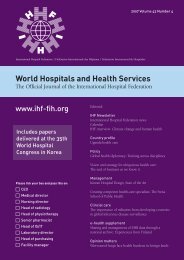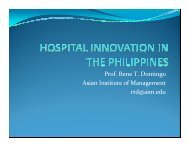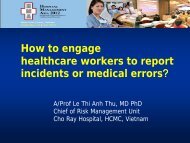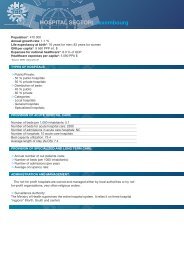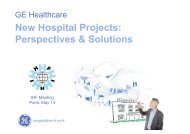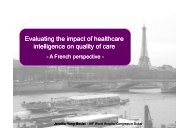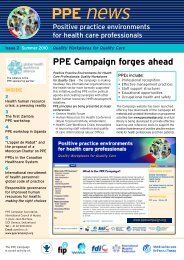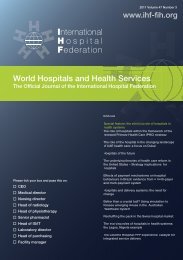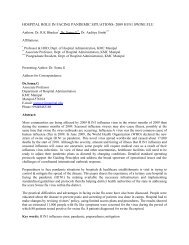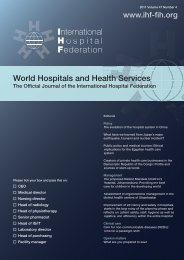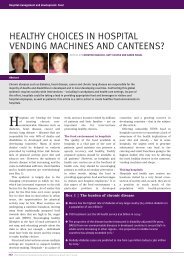World Hospitals and Health Services - International Hospital ...
World Hospitals and Health Services - International Hospital ...
World Hospitals and Health Services - International Hospital ...
Create successful ePaper yourself
Turn your PDF publications into a flip-book with our unique Google optimized e-Paper software.
IHF NEWSLETTER<br />
WORLD<br />
The Global Forum came to the following conclusions:<br />
➜ The exercise of political commitment <strong>and</strong> power is the<br />
necessary pre-requisite to ensure the implementation of<br />
the health research agenda in support of the MDGs.<br />
➜ To provide the resources necessary for essential research<br />
within developing countries, governments of these<br />
countries to spend at least 2% of their national health<br />
budgets on health research, as recommended by the<br />
1990 Commission on <strong>Health</strong> Research for Development.<br />
These funds should be used locally for health research<br />
<strong>and</strong> research capacity strengthening. Also in line with the<br />
Commission’s recommendation, donors are urged to<br />
allocate 5% of their funding for the health sector to<br />
health research <strong>and</strong> research capacity strengthening in<br />
developing countries. Monitoring the use of funds is a<br />
vital complementary activity.<br />
➜ Civil society, NGOs <strong>and</strong> communities must be involved<br />
in the governance, definition, generation <strong>and</strong> conduct of<br />
health research; in the application of the knowledge <strong>and</strong><br />
technologies it provides; in monitoring progress <strong>and</strong> in<br />
maintaining the public debate about resources <strong>and</strong><br />
priorities.<br />
➜ Innovative research should be supported by the public<br />
<strong>and</strong> private sectors <strong>and</strong> by academic institutions. Priority<br />
should be given to research <strong>and</strong> development to create<br />
technologies <strong>and</strong> products directed to meeting<br />
developing country needs <strong>and</strong> to ensuring their delivery.<br />
The private sector <strong>and</strong> governments should more<br />
intensively explore avenues to ensure sustainable <strong>and</strong><br />
equitable access to products, services <strong>and</strong> treatment.<br />
The not-for-profit private sector should continue its<br />
contributions to health <strong>and</strong> health research.<br />
➜ Research is needed into the roles of both intellectual<br />
property systems <strong>and</strong> public-private partnerships in<br />
creating health products <strong>and</strong> widening equitable access<br />
to them.<br />
Forum 9 will take place between 12–16 September 2005<br />
in Mumbai, India <strong>and</strong> will look at issues of poverty, equity<br />
<strong>and</strong> health research.<br />
For a full statement see: www.globalforumhealth.org<br />
ASIA-PACIFIC<br />
Devastating tsunami strikes southeast Asia<br />
A POWERFUL TSUNAMI caused by an underwater<br />
earthquake struck the shores of many southeast Asian <strong>and</strong><br />
African countries on the 26 December 2004, in particular,<br />
Sri Lanka, Thail<strong>and</strong>, Indonesia <strong>and</strong> India.<br />
Urgent action is now needed to address the emerging<br />
public health needs of those affected. Between three <strong>and</strong><br />
five million people in the region are unable to access the<br />
basic requirements they need to stay alive – clean water,<br />
adequate shelter, food, sanitation <strong>and</strong> health care.<br />
To address the immediate public health needs <strong>and</strong> respond<br />
to this major catastrophe, WHO estimates that it will need<br />
US$40 million.While information is still scarce after the<br />
tsunami, WHO <strong>and</strong> its United Nations <strong>and</strong> nongovernmental<br />
organisation partners are completing preliminary assessments<br />
of the human consequences of this disaster.<br />
At the time of going to press, estimates put the number of<br />
dead at more than 80,000, with as many as 300,000 people<br />
injured, many need urgent medical or surgical treatment.<br />
Countless other survivors are at risk of infectious diseases<br />
or aggravating existing health conditions. In Indonesia, for<br />
example, on the coast of Aceh, only one hospital remains<br />
operational. In Sri Lanka, much of the public health<br />
infrastructure in coastal areas is reportedly damaged <strong>and</strong><br />
functional units are overwhelmed.<br />
WHO is helping local <strong>and</strong> national authorities respond to<br />
the human crisis <strong>and</strong> enable survivors to stay alive; to help<br />
the international community focus its aid so that it can be<br />
used quickly <strong>and</strong> well; <strong>and</strong> to ensure that health services are<br />
re-established as soon as possible.<br />
From for more information see: www.who.int<br />
Moves underway to strengthen nursing in the South Pacific<br />
EFFORTS ARE UNDERWAY to establish a network of<br />
nursing leaders in the South Pacific to ensure a more<br />
effective response to health challenges affecting countries in<br />
the region.<br />
A South Pacific Forum was convened from 15–19<br />
November 2004 in Raratonga, Cook Isl<strong>and</strong>s, during which<br />
South Pacific Government chief nurses addressed a number<br />
of issues, including the establishment of a network to<br />
strengthen nursing leadership.<br />
Other areas covered included the migration overseas of<br />
nurses <strong>and</strong> midwives <strong>and</strong> the resulting shortage of staff; the<br />
threat of emerging diseases such as severe acute respiratory<br />
syndrome (SARS); rising rates of noncommunicable<br />
diseases; the need for health systems reforms <strong>and</strong> building<br />
health leadership capacity <strong>and</strong> health service delivery,<br />
particularly in rural <strong>and</strong> remote areas, due to poor<br />
equipment, lack of essential drugs <strong>and</strong> trained competent<br />
personnel.<br />
The South Pacific Forum, ‘Challenges <strong>and</strong> Actions for<br />
Nursing <strong>and</strong> Nurses in the South Pacific,’ convenes every<br />
two years to enable nurses to share their interests,<br />
achievements <strong>and</strong> concerns, update their clinical<br />
knowledge, <strong>and</strong> make recommendations for united action<br />
over the next two years.<br />
For more information contact: Kathleen Fritsch, WHO<br />
Regional Adviser in Nursing, at fritsch@wpro.who.int<br />
08 | 12 <strong>World</strong> | WORLD <strong><strong>Hospital</strong>s</strong> hospitals <strong>and</strong> <strong>Health</strong> <strong>and</strong> health <strong>Services</strong> services | Vol. 40 No. 4



